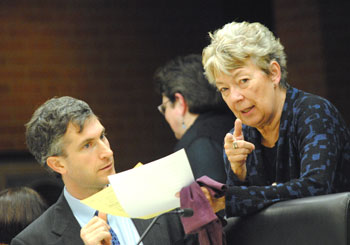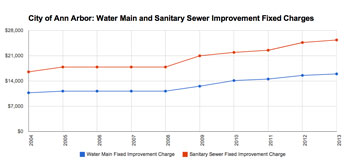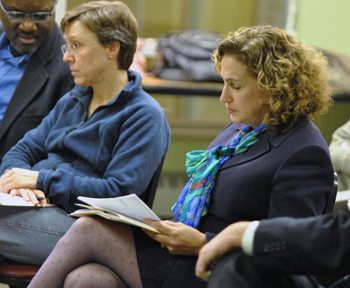Ann Arbor city council meeting (Dec. 5, 2011): In a meeting that pushed well past midnight, the Ann Arbor city council backed off making a temporary reduction to the city’s public art funding.

Marsha Chamberlin and Christopher Taylor (Ward 3) before the start of the Ann Arbor city council's Dec. 5 meeting. Chamberlin is chair of the Ann Arbor public art commission. (Photos by the writer.)
At its Nov. 21 meeting, the council had given initial approval to ordinance revisions that included temporarily reducing the required 1% allocation to public art from all city capital improvement projects, dropping the amount to 0.5% for the period from 2012 to 2015. Neither that provision, nor one that would have required allocated funds to be spent on public art within a specific period of time, survived a final vote. What did survive was a prohibition against using general fund dollars for public art projects, as well as an exclusion of sidewalk repair from the definition of projects triggering the public art requirement.
Councilmembers who had previously argued for the temporary reduction, but changed their positions after intense lobbying by the arts community – both privately and at the lengthy public hearing – included Sandi Smith (Ward 1), Christopher Taylor (Ward 3) and mayor John Hieftje. All face possible re-election campaigns in 2012. Questions about the legal foundation of Ann Arbor’s public art program, which taps utility fees and dedicated millage funds to pay for public art, were raised again at the meeting by Stephen Kunselman (Ward 3).
In other significant business, the council gave final approval to an expansion of the area around Ann Arbor that is eligible for protection using funds from the voter-approved greenbelt millage.
The council also approved its side of a deal to contract out Ann Arbor police dispatching services to the Washtenaw County sheriff’s office – at an annual cost of $759,089. The city expects eventually to save $500,000 a year with the move, which will entail laying off all of the city’s current dispatchers, not all of whom would be able to obtain employment within the expanded sheriff’s office dispatch operation.
The council also formally tabled a proposed ordinance that would have provided residents with the ability to forbid the delivery of newspapers to their property – by posting a notice on their front doors. The city’s code already prohibits depositing newspapers onto sidewalks.
A sidewalk along Dexter Avenue, east of Maple Road, was the subject of a special tax authorized by the council to be applied to property owners there. The city will use the funds to construct a continuous sidewalk along that stretch, and make curb and gutter improvements.
The council took care of several housekeeping issues, including approving its set of rules for the coming year and making its committee appointments. Those included the appointment of Christopher Taylor (Ward 3) as the council representative to the board of the local development finance authority – replacing Stephen Rapundalo, who was defeated by Jane Lumm (Ward 2) in the Nov. 8 election. But Rapundalo was appointed as a citizen representative to the board and will thus continue to serve on that body. Council committee appointments were only slightly shuffled, because Lumm was assigned to a number of spots Rapundalo had previously filled.
At the end of the meeting, Hieftje announced a nomination to replace Sue McCormick on the board of the Ann Arbor Transportation Authority – Eli Cooper. Cooper has previously served on the AATA board and is the city’s transportation program manager.
Highlights during public commentary included advocacy for a 24/7 warming shelter to be staffed by volunteers from the community, and support for 14-year Ann Arbor resident Lourdes Salazar Bautista, who faces deportation later this month. [Full Story]






